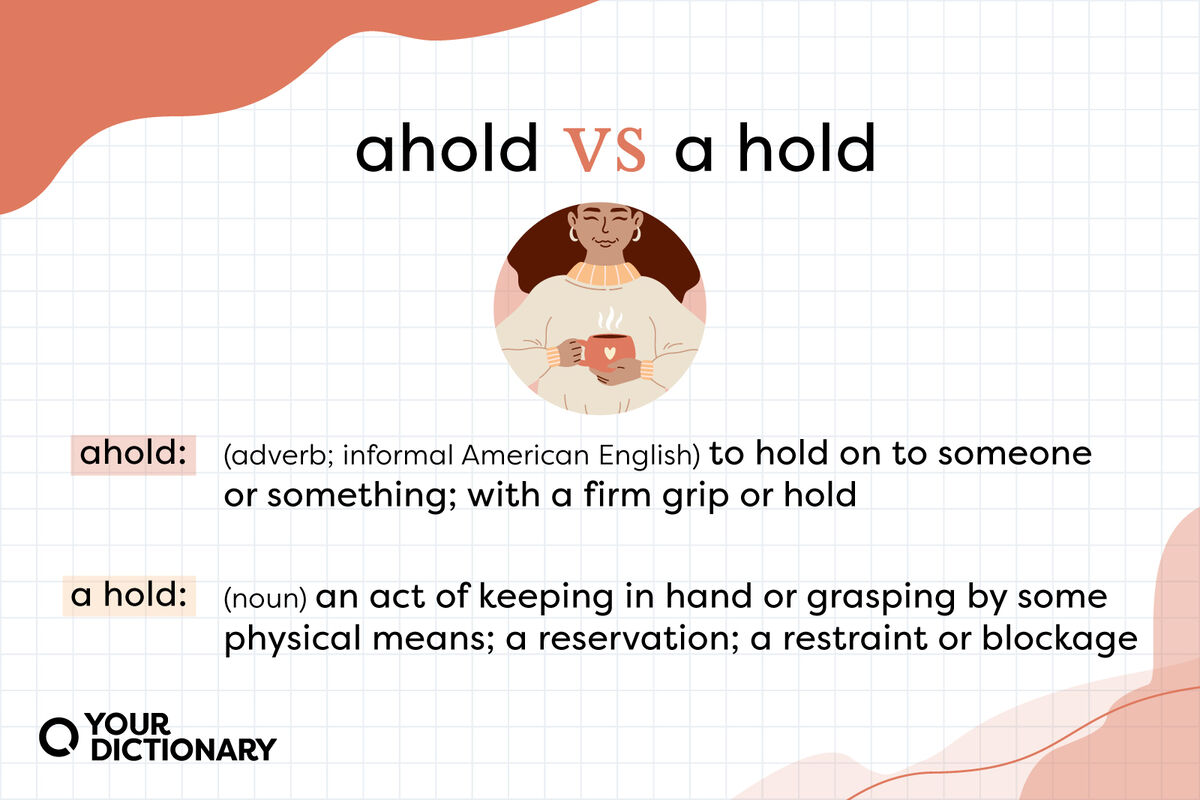
Hold music is one of the most incredible inventions known to humankind. We could all use some enchanting music while we try to get ahold of someone. Or is it a hold? They have slightly different uses, ahold being a purely American invention, but knowing the difference between ahold and a hold will be helpful the next time you’re on hold.
What Does “A Hold” Mean?
Hold has a few different meanings, but in this case, we’re looking at the noun form.
Hold as a noun most commonly refers to “the act of keeping in hand or grasping by some physical means.” Putting that a in front of hold refers to the singular form of one of these.
- The wrestler applied a hold to her opponent’s neck.
- Thankfully, I had a hold on my dog’s leash when he smelled the bacon from across the street.
A hold can also refer to “a reservation” or “a restraint or blockage.”
- The bank put a hold on my account due to some suspicious purchases of broccoli.
- I put a hold on that library book because I really wanted to read about the history of hot dogs.
What Does “Ahold” Mean?
Ahold is an adverb that means “to hold on to someone or something; with a firm grip or hold.”
Ahold is almost always followed by the preposition of, making the common phrase ahold of.
- He took ahold of the box of chicken nuggets, making sure he wouldn’t drop his dinner.
- Make sure you grab ahold of the railing when you walk down those slippery steps.
Ahold is actually an informal colloquialism used primarily by Americans, meaning you likely won’t see or hear it anywhere outside of the U.S. It first appeared in print in 1850, and while some people say it’s a regionalism that is isolated to the American South, ahold can be found throughout the U.S.
Hold led to the unexplained phonetic variation holt, used in the midland and southern counties of England, as well as parts of the U.S. This also led to the creation of the word aholt, which was first used in print in 1868.
When To Use “Ahold” or “A Hold”
Usage ultimately comes down to the part of speech that you’re going for. Ahold is an adverb that describes an action, while a hold is an indefinite article with a noun.
Usually, you can replace ahold with a hold without much issue.
- She took ahold of her partner’s hand as they walked toward the hot dog stand.
- She took a hold of her partner’s hand as they walked toward the hot dog stand.
It’s worth noting that ahold is generally considered informal, meaning you shouldn’t use it in your essays, business emails, or other formal writing.
The good news: You can just as easily replace ahold with hold to get the same meaning.
- I grabbed ahold of the chili dog.
- I grabbed hold of the chili dog.
“Get Ahold Of” vs. “Get A Hold Of” vs. “Get Hold Of”
The most common usage of ahold and a hold is in the phrase get ahold of or get a hold of. The phrase typically means “to physically or figuratively hold something; to maintain control; to communicate with.”
Which one should you use? Well, given what we’ve talked about before, they’re largely interchangeable.
- My friend had trouble getting ahold of himself when he was excited.
- My friend had trouble getting a hold of himself when he was excited.
- I couldn’t get ahold of my brother to figure out his holiday plans.
- I couldn’t get a hold of my brother to figure out his holiday plans.
- She’s so hard to get ahold of after starting her new dog bathing job.
- She’s so hard to get a hold of after starting her new dog bathing job.
What’s interesting is that in most of the world, you wouldn’t use either. Most trends show that get hold of is historically and globally the far more popular phrase.
That means that none of the above are necessarily wrong, though ahold still remains an informal colloquialism. If you’re not sure, stick with get hold of.